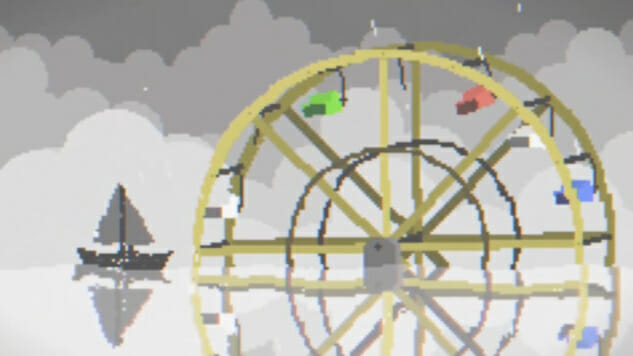Confronting Climate Change and Communication in The Things We Lost in the Flood

While floating through the minimalist world of The Things We Lost in the Flood, the environmentally existential new videogame from Awkward Silence Games, I came across a message in a bottle written by another player. This had happened many times during my time in the game, but this one consumed me: it confirmed that there was an ending to a game I’d otherwise deemed hopelessly cyclical, and was ready to give up on. In my hunt for the game’s conclusion, I ended up contributing to the inevitable death of The Things We Lost in the Flood’s digital ecosystem.
The world of The Things We Lost in the Flood is barely grasping on to life as is. Beginning with a lore dump, the game explains that “On April 14th 1993 a tap started running somewhere in the Atlantic Ocean and it never really stopped. The water was grey, ice cold and people said it dragged you under. Most of your world was submerged after 18 months.” Already rife with environmental metaphor, The Things We Lost in the Flood will eventually reach its apocalyptic conclusion when enough players solve the game’s ecological crisis and reach the ending; according to a Tweet from developer Dean Moynihan, once 100 people complete the game, it will “will end for everyone. For good.”
What that means is, despite its good intentions, The Things We Lost in the Flood’s environmental message is muddied.
At its core, though, The Things We Lost in the Flood forces players to reckon with their own self-involvement in the face of overwhelming ecological disaster. The game reveals how a mass catastrophe like climate change prompts individual reflection despite the imperative for stronger community action to solve a crisis.
It’s entirely possible to play through all of The Things We Lost in the Flood unaware of the game’s larger structure. You could just spend an afternoon with its immersive sound design and minimalist pixel art, picking up random bottles with heartfelt confessions and groan-inducing jokes and sending your own. To do so is to fall into the game’s metaphorical trap. The barely-there signifiers that the game has an ending represents the intangibility endemic to climate change, effectively lulling players into a bystander effect-esque passivity by letting the personal messages drown ones that might ground the structure of the game.
Why aren’t there more bottles floating in the game’s servers that hint at the ending, explaining how to complete the game? The overwhelming amount of messages found in bottles are emotional, despairing confessions from other anonymous players. Responding to prompts like “What do you fear most?,” the messages are often lovely and heartbreaking manifestations of loneliness, but after discovering the presence of an ending, I couldn’t help but wonder why more players aren’t guiding others to the game’s conclusion.

That ambiguity is pivotal to the environmental message, though. Climate change poses an epistemological problem: how do we confront and communicate the severity of the ecological disaster we are living through when its impacts will outlive humanity and its origins are intrinsically tied to us? (Worth noting—the vaguely defined crisis in the game is a result of machines; the solution lies in their destruction, the only hamfisted metaphor present.)
By barely even acknowledging the presence of an ending, The Things We Lost in the Flood gestures toward these questions by recognizing that we don’t have the answers to climate change despite wanting to solve them—despite needing to solve them. The path toward the game’s solution is not particularly challenging so much as it is a question of endurance. In conjunction with the game’s bottle system, the community-driven ending reveals our tendency toward individual reflection and passivity rather than collective action.
Should players use the communication mechanic to help others reach the game’s ending, they’re bringing The Things We Lost in the Flood’s ecosystem one step closer to death. Players that choose to use the messages in the bottles to open up and share secrets, meanwhile, are actually keeping the game alive by delaying the servers from being shut down.
In environmental movements, there’s only so much that individual action accomplishes; making the personal choice to stop eating factory-farm produced meat is a good start, but until these farms cease to offload massive amounts of pollution, one person’s action will remain largely ineffective. The momentum gained from more and more individuals joining this movement, however, leads to the collective action required to effectively combat climate change.
Through its messaging system and nihilistic ending, The Things We Lost in the Flood materializes that momentum from individual to collective action while still recognizing that language can barely capture the severity of the situation. In effect, that leads people to use it for predominantly emotional and memetic means, masquerading the crisis at hand.
The game ending “for good” suggests a self-contained digital apocalypse that will likely elevate the heart rate of a games preservationist, but the path toward shutting down the game’s servers is a steep uphill battle—only 38 people have completed the task at the time of this writing. Despite predicating its message on the death of an ecosystem, the battle to kill The Things We Lost in the Flood ultimately reflects the unfortunate realities of contemporary environmental movements, and the difficulties of making substantive progress. As it stands, The Things We Lost in the Flood’s world exists in a state of perpetual dying. It shouldn’t take a message in a bottle to remind us that ours is, too.
The Things We Lost in the Flood is available at a pay-what-you-want rate on itch.io.
Harry Todd is an intern for Paste that likes noise music and dreary videogames. You can find him on Twitter @babe_emoji.